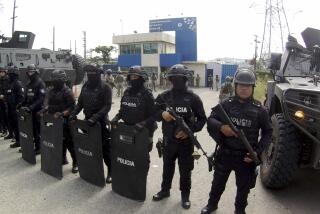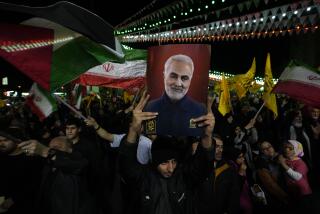Views Differ Over Responsibility for Embassies in Iraq
- Share via
WASHINGTON — Although the Pentagon insisted Thursday that it is not responsible for securing foreign embassies in Baghdad, U.N. officials and several legal experts said that under international law, the U.S.-led Coalition Provisional Authority is responsible for the safety of diplomatic missions in Iraq.
“Under the Fourth Geneva Convention, the occupying power has responsibility for law and order and security,” said Fred Eckhard, a spokesman for U.N. Secretary-General Kofi Annan, after an attack on the Jordanian Embassy in Baghdad on Thursday that left at least 12 people dead.
U.S. defense officials said the job of protecting the embassies has been left to the newly reconstituted Iraqi police force. “The way to address the problem [is] internal security provided in Iraq by Iraqis,” Lt. Gen. Norton Schwartz, director of operations for the Joint Chiefs of Staff, said at the Pentagon. “It is far more likely that Iraqis will guard embassies of other nations in Baghdad.”
Pentagon officials said that they did not yet know who bombed the embassy or whether the attack marked a shift in tactics by guerrillas who have carried out hundreds of assaults with rifles, grenades and small explosives since President Bush declared major combat over May 1. What is clear, analysts say, is that the gap between the security that Iraqi police are capable of providing and the security that coalition forces are willing to provide leaves attackers wide berth to operate.
In Baghdad, U.S. civil administrator L. Paul Bremer III did not comment on the bombing.
Several analysts say that as the leader of the occupying force, the United States bears ultimate responsibility.
Laurence E. Rothenberg, a fellow at the Center for Strategic and International Studies and a specialist in international law, said that under the Hague Regulations of 1907, the United States, as an occupying power, was responsible for “taking all measures in its power ... to ensure public order and safety.”
At some point, he said, the occupier can transfer that responsibility to the new Iraqi Governing Council and local police, but until an independent Iraqi government is established, “I’d say the United States is still responsible for public order and safety.”
Wherever the legal responsibility lies, many Iraqis insist that the moral onus rests firmly with the Americans.
Although five Iraqi police officers were in the Jordanian Embassy when the deadly attack occurred, Iraqi police have only recently begun to have a presence on the streets and are just beginning to learn Western approaches to investigating crime and arresting suspects. They have had some successes when working in joint patrols with American military police, but security in Baghdad remains extremely volatile.
Schwartz insisted that the U.S. military’s best course was to leave the Iraqi police force to guard diplomatic buildings, freeing American soldiers to track anti-coalition guerrillas.
“I would say you really don’t defend against it,” Pentagon spokesman Lawrence Di Rita added. “You stay on offense.”
By targeting Jordan, one of the United States’ most consistent allies in the Arab world, the attack appeared to send a signal that to be a friend of the Americans was to be a potential target.
Secretary of State Colin L. Powell expressed regret over the attack in a call to the Jordanian foreign minister and said the Coalition Provisional Authority would “do what it can to secure the site” of the bombed-out embassy, according to a senior State Department official.
The initial U.S. reading was that the attack was aimed at undercutting support for the Iraqi Governing Council, the official said.
Theories of potential suspects included loyalists of deposed President Saddam Hussein who were angered by Jordan’s role in helping Americans in the war, Hussein opponents angry that Jordan gave asylum to the ex-dictator’s daughters last week, and Al Qaeda-style militants who harbor strong anti-American feelings but find easier targets among U.S. allies.
Hendren reported from Washington and Farley from the United Nations. Times staff writers Alissa J. Rubin in Baghdad and Bob Drogin, Paul Richter and Robin Wright in Washington contributed to this report.
More to Read
Sign up for Essential California
The most important California stories and recommendations in your inbox every morning.
You may occasionally receive promotional content from the Los Angeles Times.













